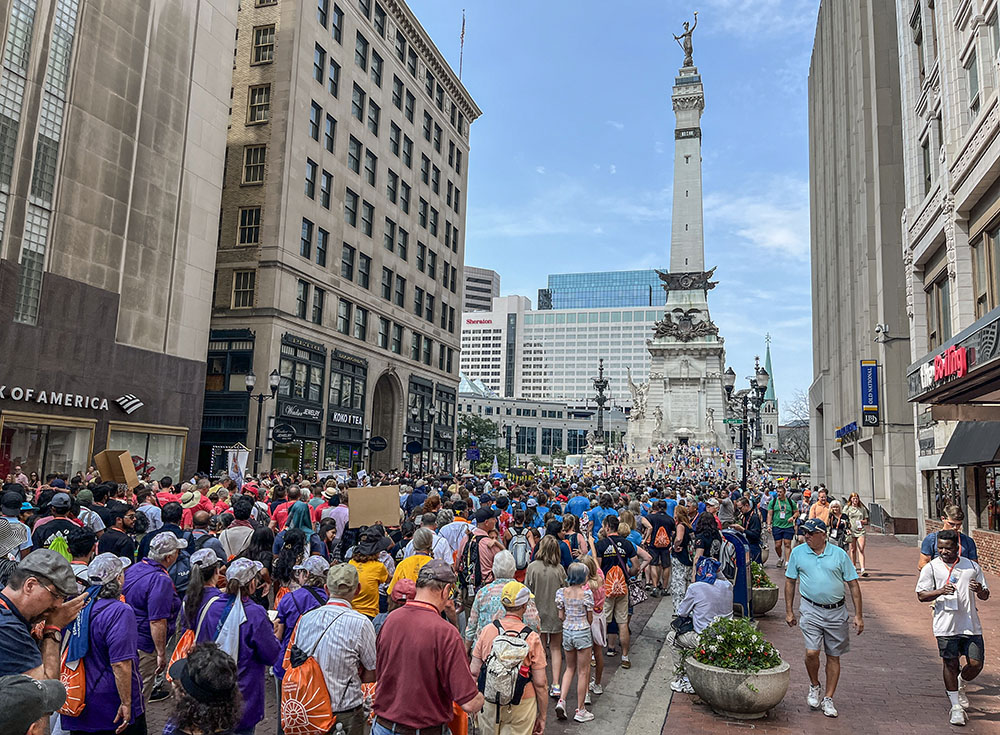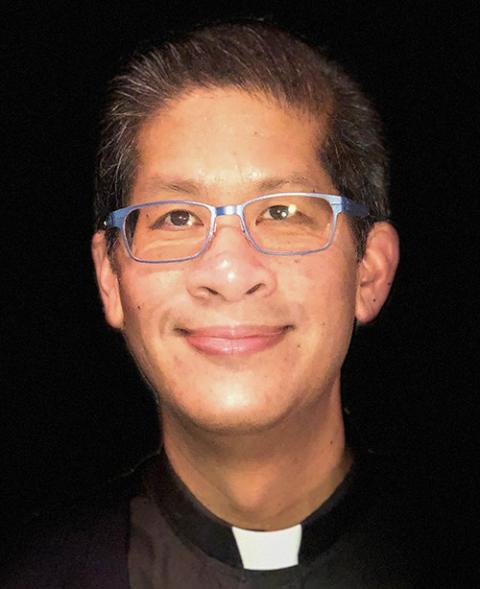
Thousands walk down Meridian Street past the Soldiers and Sailors Monument in Indianapolis July 20 for a eucharistic procession in conjunction with the National Eucharistic Congress. (OSV News/Peter Jesserer Smith)
Religion, Catholicism included, can exacerbate political and cultural polarization in the United States, or it can serve as a bridge by fostering communication, understanding and respect, said a presenter at the National Eucharistic Congress on July 20.
"Polarization is a very delicate topic. We all know we're going through it in our nation, and in our church," said Fr. Ricky Manalo, a Paulist priest, theologian and author who serves as an adviser to the U.S. Conference of Catholic Bishops' Committee on Cultural Diversity.
In a 45-minute presentation, titled "One in Christ, Divided in Politics: The Eucharist in a Time of Polarization," Manalo told an audience of several hundred people that the Catholic intellectual tradition and the Eucharist offer vital solutions to the bitter partisanship and ideological divisions that have gripped the country and the U.S. Catholic Church.
"Addressing toxic polarization is not without its challenges," Manalo said. "It requires patience, humility and a willingness to engage in uncomfortable and difficult conversations. However, it also presents opportunities for growth, transformation and, dare I say, conversion."
To illustrate how deep current divisions run, Manalo referenced studies indicating that majorities of Americans are not only afraid to share their political views with friends and relatives, but that they see their fellow citizens as bigger threats than hostile economic forces, natural disasters and foreign enemies.
"And this is really alarming," Manalo said as he highlighted a PBS NewsHour/NPR/Marist poll that suggests one in five Americans — roughly 66 million people in the United States — are ready to resort to violence in order to "save the country."
"How did we get here?" Manalo asked.
The effect of such "toxic polarization," Manalo said, has been to pit people against one another, where individuals not only disagree with each other but harbor feelings of distrust and animosity, even hatred, toward the other.
"Even if they're members of our own family, even if they're members of our parish or faith community," Manalo said.
In addition to partisan news outlets and social media, some have blamed the country's two-party system itself for abetting polarization. However, Manalo said the fact that the Democratic and Republican parties dominate the country's electoral politics is not in and of itself bad or evil.
"If we had dialogue, we could borrow wisdom from all different perspectives," said Manalo, who emphasized that he was not asking anyone to change their political beliefs or their party affiliation.
"There's nothing wrong with having strongly grounded beliefs and opinions," Manalo said.
Advertisement
The key, Manalo said, is being able to listen attentively to one another with a sense of empathy.
"Miscommunication and misunderstanding often fuels polarization," said Manalo, who cited the biblical story of the Tower of Babel as a cautionary tale regarding the consequences of disunity and failing to communicate.
"When people no longer understand each other, community breaks down, and unity becomes impossible," he said.
Manalo said the Eucharist can bridge those divides by focusing on a common faith that fosters a sense of solidarity. He said the sacrament offers a model of humility and sacrifice that challenges Catholics to eschew partisan agendas in favor of seeking common ground.
"The Eucharist encourages believers to see each person as a beloved child of God, to see beyond our differences, to recognize that all are created in God's image and are equally valuable," Manalo said.
Cheryl Chalfant, a resident of Huntertown, Indiana, who attended the congress and listened to Manolo's presentation, later told National Catholic Reporter that confronting disagreements in her own family has taught her the importance of "leading with love" while staying true to her convictions.
"Love is attractive, love is who God and Christ is," Chalfant said. "And if we're going to live in imitation of Christ, we are called to live in love, even when that's not received, even when it's disagreed with, even when our perspective may be marginalized or ridiculed."
John Nolan, a resident of Wexford, Pennsylvania, who also listened to Manolo's presentation, shared his own experiences in his family where certain words or statements tend to shut down conversations.
"What happens is everyone ends up arguing, rather than listening," Nolan told NCR. "We have to be disciplined enough to listen first before we speak, and to understand and have dialogue more so than arguing with one another."
The Gospel imperative of evangelization, Manalo said, can build unity and heal polarization by reminding Catholics of their primary identity as disciples of Jesus Christ.
Said Manalo, "The Eucharist can indeed help heal the rifts in our divided society."





